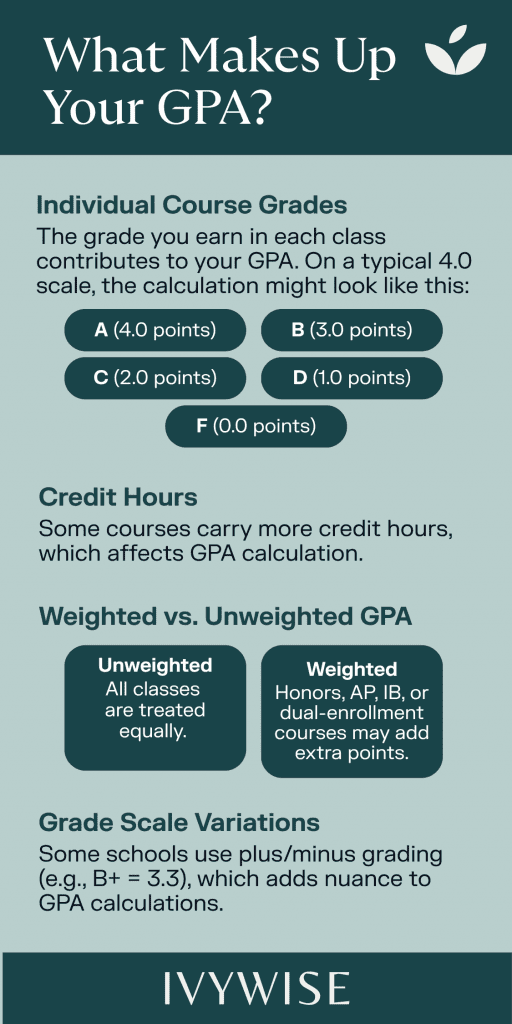Most students applying to college understand the importance of high school grades. After all, your grades are the most critical part of your college application — and the first factor admissions officers review. But while grades are important, they are not the only factor that matters in gaining admission to college. Let’s look at the impact of high school GPA in the college admissions process in context with the other elements of your application.
The Weight of High School Grades in College Admissions
Your grades are the most important indicator of your academic ability and college readiness. Admissions committees look at high school transcripts to see how applicants perform over time across different subjects. Maintaining good grades demonstrates a mastery of various skills that are valued by colleges, including self-discipline, effective study habits, organizational, planning, and time management.
How Colleges Evaluate High School Performance
It’s worth noting that your academic performance isn’t just your grades — college admission criteria include several factors:
- Course rigor: Did you take advanced classes, such as AP or honors courses?
- Grade trends: Do your grades show improvement over time?
- Class rank (if provided): How do you compare to your peers in the same school?
- Context: How strong is the school’s curriculum? What are their grading policies and what opportunities do they offer students?
- Standardized test scores: Do your test scores demonstrate mastery of the subject and academic preparedness for college?
GPA vs Test Scores
The role of standardized tests continues to be important despite many schools going test optional. Both the ACT and SAT test the core knowledge and skills that you need to succeed in college. Additionally, these tests act as an equalizer, since students come from diverse academic backgrounds with varying curriculums and grading systems. At IvyWise, we recommend taking the SAT or ACT even if you’re planning to apply to test-optional schools. A high GPA and strong test scores together will strengthen your application and make you more competitive.
Understanding GPA: More than Just a Number
Now that you understand a bit more about how colleges review grades, you might be asking yourself, “how is GPA calculated and why does it matter?”
GPA Components
There are several components that make up your GPA, and these can vary by school.

Admissions committees consider your GPA in this context, and some colleges may even recalculate your GPA with their own scale to help them make fair comparisons between applicants.
The Impact of Grade Inflation
Grade inflation refers to the trend of students receiving higher grades than their performance merits, which means their GPA may not accurately reflect their academic ability or effort. This can make it more challenging for admissions officers to distinguish truly high-achieving students. However, they can use your class rank and school profile to contextualize your GPA, and other factors — test scores, course rigor, recommendation letters, extracurriculars, and so on — can also give them a more complete picture of who you are as a student.
The Role of Standardized Tests in College Admissions
Many colleges and universities that shifted to test-optional admissions during the pandemic have since reinstated their standardized testing requirements. Test scores continue to be an important metric in college admissions because the SAT and ACT serve as common benchmarks across schools and regions. They complement high school grades by:
- Providing context: Since grading standards vary by school, test scores help admissions officers compare students more fairly.
- Highlighting academic strengths: A strong math or reading score can reinforce a student’s performance in those subjects.
- Balancing GPA inconsistencies: If a student has a lower GPA, a strong test score can, in some cases, validate their academic potential. This largely depends on the overall strength of the application and the selectivity of the college.
- Supporting merit scholarships: Many scholarships still use test scores as a key criterion.
While over 2,000 schools in the U.S. remain test-optional, most colleges use test scores along with the transcript evaluation to get a more complete academic profile of an applicant. Submitting a strong test score, even to a test-optional school, is a great way to gain a competitive edge. This is why we recommend using the test preparation strategies that work best for you — the better your score, the more you maximize your chances of admission.
Extracurricular Activities: Beyond Academics
Your extracurriculars help colleges understand who you are beyond academics and how you make an impact both inside and outside of school. However, you need to be intentional about your involvement by choosing activities that reflect your passions or career goals. It’s important to focus on quality over quantity — colleges want to see sustained involvement in a few activities.
Building Skills Through Your Activities
So, what impact do extracurricular activities have on college readiness? You develop skills that are essential for success — not just in college, but also in life.
- Collaboration: Teamwork in clubs or sports mirrors group projects in college.
- Leadership: Finding ways to exhibit leadership in your activities will prepare you for campus roles and future careers.
- Communication: Your activities can help you hone your public speaking, writing, and interpersonal skills.
- Resilience and adaptability: You become more resilient as you manage setbacks in projects or competitions.
- Social awareness and responsibility: Civic engagement, such as volunteering and activism, helps you develop these skills.
Presenting Your Extracurriculars in Your College Application
According to IvyWise counselor Rod, your Common App activities list is one of the most important components of your application. “Even the briefest 150-character descriptions, when written thoughtfully, can add depth to your application and help you stand out in a competitive pool,” he says. So, how can students select and present their extracurriculars effectively?
For starters, you will list up to 10 extracurriculars in order of their importance to you. Once you’ve decided which extracurriculars to present, you need to be intentional about how you describe them. Use action verbs, be specific about your contributions and their purpose or result, and use numbers to quantify your impact — it’s important to be concise, but your descriptions also need to pack a punch.
High School Curriculum and College Readiness
The high school curriculum is designed to build foundational knowledge in core academic areas, such as English, math, science, social studies, and foreign languages. Most high schools also offer electives — psychology, computer science, music, and business are just a few examples — which allow students the flexibility to explore potential majors and career paths. Beyond that, students learn skills that are crucial for college readiness: critical thinking, problem-solving, time management, and good study habits, among others.
High school counselors play a crucial role in advising on course selection to ensure students are academically prepared for college and positioned to take advantage of opportunities like AP or honors classes. On the most basic level, students should focus on completing the core requirements for college admissions:
- English (4 years): Strong reading and writing skills are essential across all majors.
- Math (at least through Algebra II or higher): Math skills are especially important for STEM fields.
- Science (biology, chemistry, physics): Lab-based courses are ideal.
- Social studies (history, government, economics): These courses build analytical skills and civic understanding.
- Foreign language (2-3 years): Many colleges require or recommend it.
Advanced Courses
If you want to be a competitive college applicant, it helps to take the most rigorous courses you can. The benefits of AP and honors courses cannot be overstated. These classes demonstrate that you can handle the academic rigor of college. You might also get a GPA boost, depending on your school. If you earn strong AP exam scores, you may receive college credit or be able to skip introductory courses.
Transitioning from High School to College
The transition from high school to college can be a daunting one both academically and socially. Not only is college coursework more demanding and self-directed, but students are typically dealing with adult responsibilities for the first time without parental support. Making new friends and adjusting to a new environment can cause additional stress, which can impact mental health. Even students who have good time management skills may find it challenging to balance classes and studying with their personal life at first, especially since class schedules are less structured in college.
These college transition tips can help:
- Develop strong study skills by practicing note taking, time management, and self-discipline in high school.
- Choose a rigorous curriculum that simulates college-level expectations, such as honors or AP courses. You can even look at dual enrollment classes.
- Seek guidance from counselors or mentors about course selection and college prep.
- Get involved early by joining clubs or activities to build social skills and confidence.
- Practice independence by learning basic life skills like budgeting, cooking, and scheduling.
Many colleges support incoming students by offering strategies for managing the transition, such as time management workshops, peer mentoring, summer bridge programs, and academic skill-building resources. Incoming students at most colleges participate in orientation programs to introduce them to campus life, resources, and expectations.
Achieving Success in College: Strategies and Tips
To achieve success in college, you need self-discipline, motivation, strong time management skills, and effective study habits, among other things. But it’s not enough to just do the work — you should also be engaged in class, meet with faculty during office hours, and take advantage of campus resources (e.g., tutoring, academic advising, libraries, and writing centers).
The Importance of Self-Discipline and Motivation
Who among us hasn’t had days when we felt like doing nothing, yet we forced ourselves to do what needed to be done? That’s self-discipline, and it’s crucial in college. You need it to resist distractions and stay focused on long-term goals. But when you are also motivated, it makes self-discipline that much easier.
So, how can you stay motivated throughout your college journey? Here are some tips:
- Connect your studies to personal goals. Understand how your coursework aligns with your passions or future careers.
- Celebrate small wins. Don’t wait until you’ve accomplished something big. The small wins build momentum and are worth celebrating.
- Stay organized. Use planners or apps to track assignments and deadlines — staying on track with your to-do list can keep you from feeling overwhelmed.
- Build a support network. Friends, mentors, and study groups can provide encouragement and accountability.
- Stay curious. Exploring electives or extracurriculars can reignite your interest and passion.
Integrating High School Achievements into College Success
By now, you’ve learned that there’s much more to setting yourself up for success in college than just getting good grades in high school. Your achievements — both academic and extracurricular — help you build essential skills and demonstrate your commitment. Additionally, your achievements enhance your college application and can open doors for you in terms of scholarships, advanced placement, and honors programs. Successfully balancing your academics and extracurriculars will help you transition to college with a sense of capability and purpose.
The journey from high school to college is full of challenges and milestones. IvyWise helps students navigate this pivotal time with confidence. Our expert college admissions counselors — all former admissions officers at top schools — know what colleges are looking for and how to help you build an academic and extracurricular profile that stands out. Schedule your complimentary Discovery Call with us today.
Contact Us





